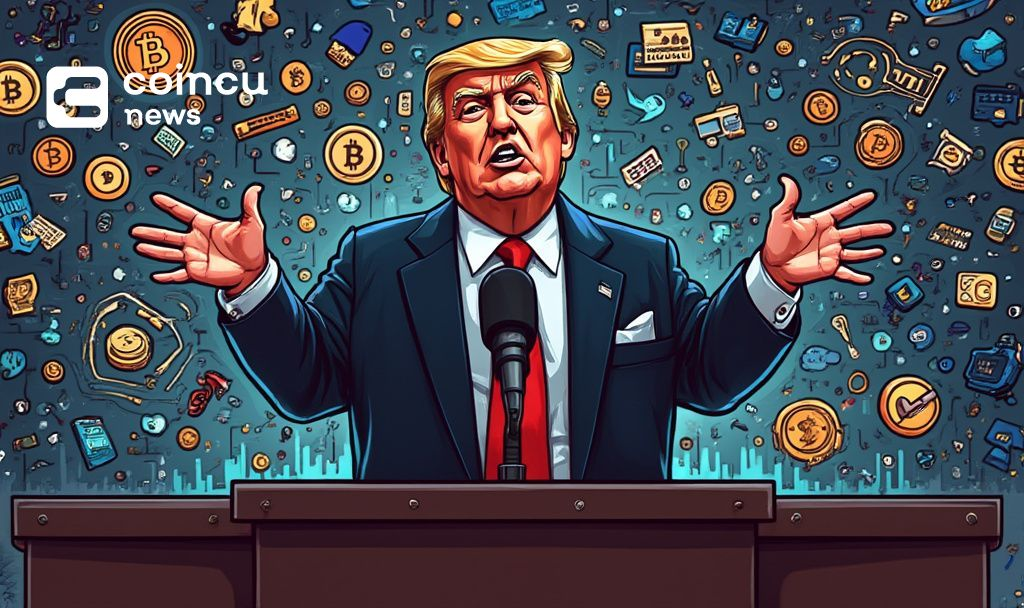 CaryptosHeadlines Media Has Launched Its Native Token CHT.
Airdrop Is Live For Everyone, Claim Instant 5000 CHT Tokens Worth Of $50 USDT.
Join the Airdrop at the official website,
CryptosHeadlinesToken.com
CaryptosHeadlines Media Has Launched Its Native Token CHT.
Airdrop Is Live For Everyone, Claim Instant 5000 CHT Tokens Worth Of $50 USDT.
Join the Airdrop at the official website,
CryptosHeadlinesToken.com
- Trump’s pro-crypto policies could prompt Latin American governments to adopt Bitcoin more openly.
- Experts predict gradual changes in regulation and increased foreign investment in the region.
As Donald Trump prepares to return to the White House, his pro-cryptocurrency agenda is gaining attention worldwide, especially in Latin America. With Bitcoin already establishing a significant presence in the region, the former president’s policies could further reshape its role in Latin American economies.
Trump’s vision involves creating a robust Bitcoin ecosystem in the U.S. by supporting crypto-mining, preventing the creation of a digital central bank currency, and removing capital gains taxes on Bitcoin transactions.
These policies are likely to ripple across Latin America, where the U.S. has a strong influence on regulatory trends.
Aníbal Garrido, a cryptocurrency consultant and director of the BT&C Academy at Andrés Bello Catholic University in Venezuela, notes that the impact of Trump’s policies will primarily be felt through the regulation of the cryptocurrency sector.
While these policies are designed to attract investors, Garrido argues that their true potential lies not in acquisition but in how they encourage the use of Bitcoin.
He anticipates that Trump’s administration will primarily focus on opening the regulatory landscape, which could increase the entry of new investors, although not necessarily ordinary users.
In contrast, María Fernanda Juppet, CEO of the CryptoMKT exchange, believes that Trump’s favorable stance on cryptocurrency will have a domino effect in Latin America, prompting governments in the region to embrace crypto as a tool for financial inclusion and economic development.
Juppet suggests that the U.S. often sets regulatory precedents that Latin American countries follow, citing previous instances where policies introduced by the U.S. led to similar actions in countries like Mexico, Chile, and Brazil. For instance, Trump’s 2017 tax cuts sparked similar moves in these countries to encourage economic growth.
Juppet also sees the possibility of increased foreign investment in Latin America as a result of Trump’s pro-crypto policies.
As financial institutions in the U.S. begin to take a more active interest in cryptocurrencies, Latin American governments might create more favorable regulatory environments to attract this capital. This shift could also help technology companies and startups in the region align with global trends.
Despite these optimistic projections, Garrido believes that the immediate effects will likely be observed through Bitcoin’s price and the interest from other nations looking to follow the U.S.’s regulatory footsteps.
Juppet also notes that for Trump’s influence to truly take hold, the U.S. needs to implement a clear and favorable regulatory framework, providing legal certainty for all players in the crypto ecosystem.
As the crypto industry in Latin America continues to mature, both experts agree that the introduction of Bitcoin reserves by national governments is a growing trend. This strategy, which has been endorsed by companies like MicroStrategy, is expected to spread to Latin America, although it may take time.
Countries with struggling economies might see Bitcoin as a means of diversifying their reserves and shielding themselves from inflation. However, the pace of this adoption will depend on the development of clear regulatory frameworks and the political willingness to adopt innovative strategies.
Ultimately, while Garrido is less optimistic about immediate Bitcoin adoption in Latin America in 2025, Juppet sees potential for gradual but significant change, particularly as governments seek to modernize and integrate more robust financial systems.













